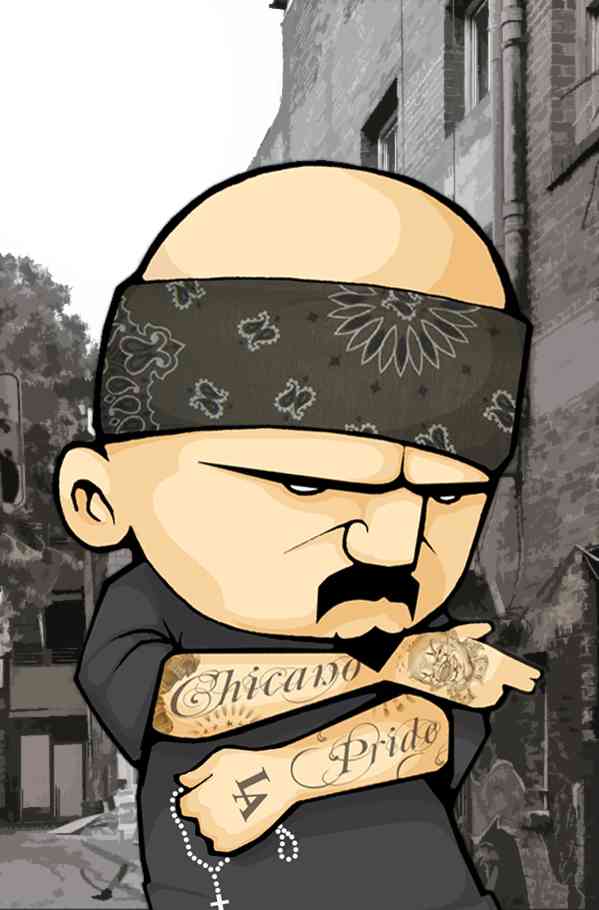In my journey as a community activist and Chicano advocate, I’ve experienced many fascinating elements that have inspired me but also scarred me to my very soul.
I have fought the Chicano politician who capitulated in the selling out of his community, broke bread with the “Old Man” whom lent the little he had but gave unselfishly of his wisdom, and have shared space with our sons who have fallen victim to a privatized prison system.
I have fought the white dragon of racism and today… today will begin the telling of those many travels.
There are many obstacles preventing the Chicano people from achieving American uni-culturalism, but none more profound than the many differing points of view available within the Chicano community itself on what it means to be Chicano.
We seem to be our own worst enemy. From the militant Chicano who stubbornly believes that his vote will never count, to the Feminist Chicana who has lost sight of the Chicano plight, to the Mexican-American who is blinded by the smoke screen of “illegal immigration” and refuses to commit to anything other than. And every one of these offshoots has a profoundly different point of view when it comes to defining who we are.
Within the Latin spectrum — from Aztec immigrant to Spanish Chicano — and all in between, sit the many facets, the nooks and crannies if you will, that blur the definition of who the Chicano truly are.
Take the Feminist Chicana and the Mexican-American for example. I can empathize with the Feminist Chicana because women’s rights are diminishing in America. Nevertheless, we mustn’t allow her to take herself away from what we need to accomplish as a community.
Recently, I contacted a Chicano advocacy organization in California that was founded by a very prominent Chicana. I wanted to interview her for a project I had been working on. Her input might have guided the Chicano community immensely in the context of the 60s Chicano civil rights movement.
But when I was finally contacted by her “scheduler”, I was immediately given the treatment. “Who was I?” “What did I want to interview her about?” “What questions will I be asking her?”
Not in a polite manner, mind you, but a very antagonistic way. She didn’t treat me the way I believe we should be treating fellow Chicano advocates. But, alas, this is the reality.
So when I asked if their organization was more involved with the women’s movement rather than the Chicano movement, that was pretty much the end of our conversation. The Scheduler would never get back to me and I would never get to interview the Chicana leader of this feminist organization set up as a Chicano advocacy.
Now, when I contacted a Mexican-American professor of Chicano studies who taught at a college in Southern California, I had come to realize how “illegal Immigration” was consuming Chicano activism to the detriment of all other Chicano issues that, I believe, are truly hindering the Chicanos Self-determination in this country.
“What can I do for you my, Brother?” the gentleman on the other end of the line bellowed with his thick Mexican accent.
I explained to him that I was a Chicano activist and was currently writing a book and wanted to create a focus group to…
“Sorry, but I must take this call brother, but call me back tomorrow so we can talk,” he would say, cutting me off. “Sure,” I told him and resigned myself to contacting him the following day.
The following day…
“Hey, brother, sorry but I am very busy. Can you call me back later?”
Later…
“Hey, brother…
“Listen,” I interrupted, “Mr. Professor, is there a time when we can discuss this thoroughly?”
“Yes, call me tomorrow after lunch and we’ll have a conversation.”
Tomorrow, after lunch…
“Hey, brother, listen, I want to help you but I am very busy. Can you e-mail me with what you want to do; then we can discuss it further. Be specific and let me know exactly what it is that you want to accomplish.”
This is what’s referred to as a gate-keepers filibuster. He would have kept this up until he frustrated or aggravated me, subsequently alienating me toward him and continuing a dynamic that seems to exist between the Chicano and Mejicano… a dynamic that needs to be discussed amongst ourselves.
Rudolfo Acuna, in his book entitled “Occupied America: The Chicano’s Struggle Toward Liberation”, writes: “… Other groups have been the victims of such forces, (i.e. racism, nativism and economic exploitation) but-with the obvious exceptions of the Indians and the blacks-they have managed to achieve a degree of acceptance and self-determination far greater than that of the Chicanos.”
In other words, besides Indians and blacks, Chicanos are at the “bottom rung of the proverbial ladder.” But since 1972, when Mr. Acuna wrote this, “Indians” have cornered the gaming industry and blacks now have a president in the White House while Chicanos by way of Mexican immigration have become America’s new slave culture.
Chicanos, how did we become America’s new slave culture? How did our leaders allow America to reduce Mexican human beings to “illegal aliens”? In a country founded by immigrants!
How is it that we have allowed our community leaders to sell us out as Motecuhzoma II had done in 1519 to the Tlaxcaltecas and a handful of Spaniards?
The time has come to hold our supposed leaders accountable. The time has come for us to collectively demand answers.
The time has come for the Chicano to wake up.
Chicanos, time to ask the NCLR what they are doing about our children’s educational future. It’s time to ask MALDEF what’s being done about the police-beating death of David Silva and the shooting of sixteen-year-old Joshua Alvarez. Time to ask, no demand, that our leaders stand up and show their faces on national media. If we can’t turn to our supposed Chicano leaders and those organizations which claim to stand for the Chicano, how are we going to demand our civil liberties from our broader American leadership?
Our fathers must take responsibility for where we are as a culture today. We must take responsibility for where our children are tomorrow.
Who are we? Time for some answers.
Reprinted with the kind permission of our amigos at LatinoLA.com.

